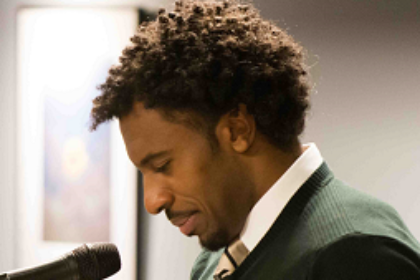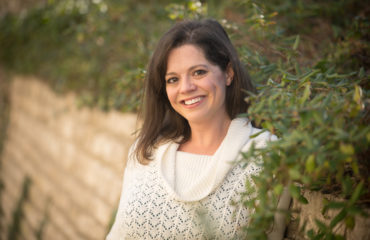TWO POEMS by Kyle Dargan

BEAUTY
Miss Iraq, the first crowned
in forty years of foreign meddling,
means it when she wishes for world peace—
her cousins’ deaths
both tallied by sectarian violence in her
war-quilted, war-torn nation.
She is aware
the pageantry— pinup smiles and stiff,
cupped hands (their rotational gesture)
—will not beckon peace. Salvation
may have functioned
such ways in old, dog-eared eras. There’s evidence:
all our parched frescos or pocked statues
depicting one or another stoic god,
its crimped hand raised,
signaling for peace like a captain calling a play.
Run peace, they might have said,
or run samsara or run godhead
if peace is too transparent a trick
name for an offensive set. In Saddam City,
today, broken men train to play
the beautiful game, to execute levity
with their feet. Under Hussein’s boot,
losses on the pitch often translated
into torture—forty degrees Celsius
sessions training to kick molded concrete
futbols or hours
spent begging deliverance from within
an iron maiden’s spiked void. Those years
we call “the dark era”—when Saddam’s son,
Mr. Uday, was the face
of Iraq’s Olympic committee,
before he would become the ace of hearts
in the most-wanted card decks
coalition troops carried in their fatigues.
“Clearly recognisable” —how the Guardian
would describe Uday
Hussein in U.S.-released glamour shots—
“despite having a thick beard
and a wound that had destroyed
part of his nose and upper lip.”
On this side
of that suffering, five years since
Iraqi Freedom’s end,
Ms. Qasim will wear the red,
green and black sash,
and the U-23 team will play
for Olympic glory, despite the death
threats that may bloom into dying.
Authority’s lens abhors
beauty—its saturation in this world,
its disregard for the vacuums
men slaughter each other to create.
THE ECONOMY OF SWALLOWED KNIVES
I warn an auditorium full of children,
Do not try this at home. Then I begin
ingesting skewers. Unintentionally,
I enlist their youthful volition
into the war against waiting to grow up.
On the drive home, they pelt their parents
with salvos of Can I and Please, while fathers
being fathers, retort, When you’re grown,
paying your own bills for your own roof,
you’ll be free to live as foolhardily as your heart
desires. There: the moment of escalation—
suddenly their every waking hour becomes
a struggle to buy back their right to self-
destruction. Lemonade stands and lawn
mowing. Frozen meat pucks flipped
under sallowed arches, endless refolding
of denim. The children sprout acne and fuzz
as their piggy banks pudge. Their minds
have long since forgotten the death-defying
blade sleight that followed my disclaimer
years ago.
They are teenagers. Everywhere
something else shouts This could kill you,
and, achingly, they answer Yes. They can
taste it: tattoos, cigarettes and sex—
any form of flirting with mortality.
Beneath youth’s aegis, they believe
themselves mighty, no matter how poor,
but soon enough they are adults renting
efficiencies and driving jalopies—stretching
dimes for the privilege of being grown.
See how this economy needed no help
in tailoring their malaise. What next?
Heat assignments for the middle-class
scramble to obfuscate death.
Then kids of their own. Then the rest.
